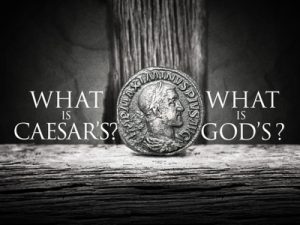 In this Gospel, Mark provides a significant amount of information about the Jewish observance of the laws ritual purity, perhaps to educate the Gentile Christians in his audience who would have had little or no experience with these laws. Well, we’re not among those uneducated, are we?
In this Gospel, Mark provides a significant amount of information about the Jewish observance of the laws ritual purity, perhaps to educate the Gentile Christians in his audience who would have had little or no experience with these laws. Well, we’re not among those uneducated, are we?
In today’s Gospel, Jesus criticizes the Pharisees for making ritual purity equal to and as binding as the Law of Moses. He teaches that we are not defiled by the food that enters our bodies but the words that spew out our mouths. Such defilement could also be the shrug of the shoulders and leaving the room with another’s question hanging in dead air. Jesus unmasks a deeper question behind the one posed by the Pharisees: Where is holiness found? What makes a “holy person”? By itself it’s not eyes cast heavenward or cast to the ground or beating your chest like the Publican. It’s not found in how we hold our hands to pray or kneeling for Communion or fasting until we faint. Nor it is wearing a veil or a habit or a chapel veil. Outward appearances don’t qualify one for sainthood. Jesus makes it clear holiness comes from within. It is evidenced in our deportment, our words, our attitudes, our interactions with each other and our care for God’s creation. Examples are watering a plant, carefully relocating a lizard to the outdoors, moving chairs quietly, gently placing objects against what could be a noisy surface, or ensuring that doors don’t slam closed. It’s kindness to our neighbor in the next room or down the hall; the sick, the newcomer, the guest, an annoying child. The evangelist John was not the first, or the last, to say: “Actions speak louder than words.” The words at the conclusion of today’s Gospel challenge us to guard against trying to merely look holy.
Jesus reminds us that we become holy when we allow God’s Spirit to transform us. Our actions and our words are a reflection of our “spiritual diet and digestive track”. Our bodies reject tainted food in often dramatic and hurtful ways, through IBS and spastic colon. In the same way, our consumption of bias, violence, snide remarks and crude language from the company we keep, our reading material or TV viewing is an abuse our spiritual digestive track cannot tolerate. It is ejected onto others, into our environment by way of our own mouths. But our spiritual diet can overcome those symptoms. We can absorb positive, helpful attitudes in prayer, with daily, deliberate practice, lectio, and interactions with Christ-like persons. We mature and radiate an expression of the conversion of our hearts.
It is worthy of our time and effort to perk up and listen to the Gospel message: “Hear me, all of you, and understand. You disregard God’s commandments but cling to human tradition.” It seems to me, Jesus’ underlying message to us, individually and communally, in this day and place, concerns teaching “human precepts” as “divine doctrine”. It can be a great temptation for many to elevate personal wishes to the “right way” of doing things. “I’m telling you: my way is the right way!” There is rarely only one right way in everyday matters.
The list of things that were once acceptable that today we shutter to see or hear about grows almost daily. Airplane passengers used to able to view the plane’s cockpit from their seats, a cloth towel hung near the kitchen sink to dry, or someone having one-sided conversations with a plug in their ear are a few examples. Open dinner buffets were more popular and you didn’t get “pinged” to view 100 photos of my day in the park or of a tired toddler up past his bedtime. Even the “Queen of Manners” Emily Post and Amy Vanderbilt have changed their minds about the “right way” to eat fried chicken.
Ponder in the week ahead Jesus’ reminder to the crowd. Pray that it may not be said of us: “This people honors me with their lips, but their hearts are far from me.”
~Reflection by Sister Roberta Bailey, OSB
Enjoy your holiday weekend …
God keep you safe
Lord on this Labor Day,
we thank You for the blessing of work.
We ask for strength to complete each day.
We ask for rest when we are weary.
We ask Your guidance
for everyone seeking employment,
and we ask that
You be with those whose faces
we might never see
but who work tirelessly each day
for the good of us all. Amen.
– from Our Sunday Visitor





